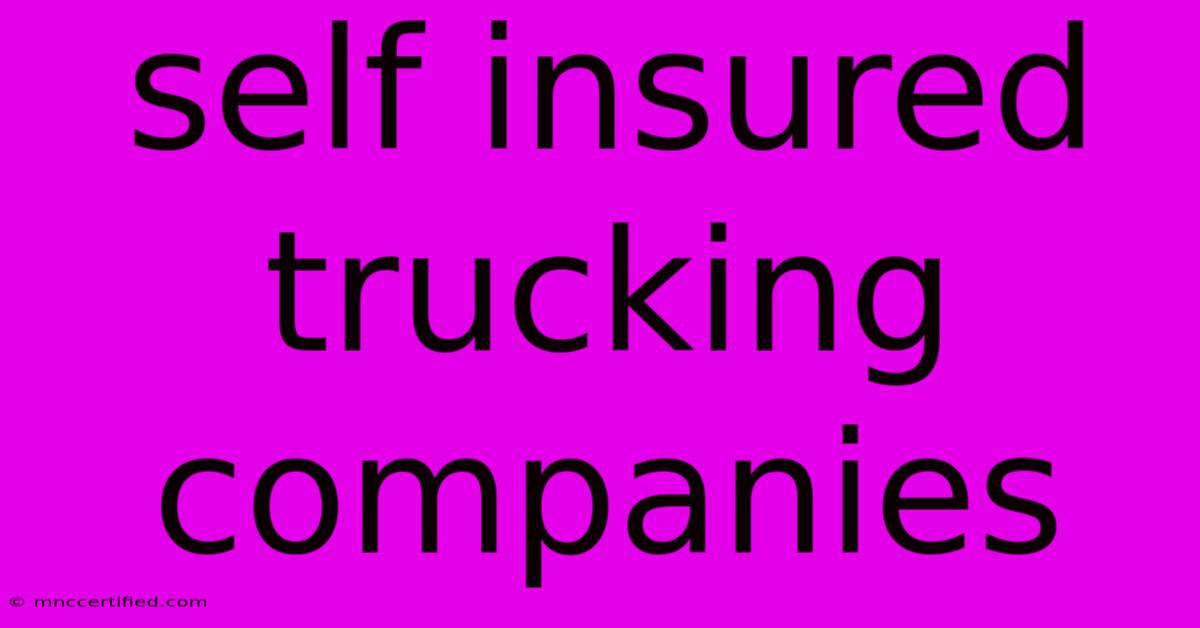Self Insured Trucking Companies

Table of Contents
Self-Insured Trucking Companies: A Comprehensive Guide
Self-insuring is a risky business, and for trucking companies, it's even more so. This guide explores the intricacies of self-insured trucking companies, detailing the benefits, drawbacks, and crucial considerations before taking the plunge. We'll cover everything from financial requirements to risk management strategies, helping you make an informed decision about whether self-insurance is the right path for your trucking business.
What is Self-Insurance for Trucking Companies?
Self-insurance, in the context of trucking, means a company assumes the financial responsibility for its own liability claims, rather than purchasing commercial auto insurance from a third-party insurer. Instead of paying premiums to an insurance company, a self-insured trucking company sets aside funds in a reserve account to cover potential accidents, injuries, and property damage. This reserve acts as a self-funded insurance policy.
Advantages of Self-Insuring Your Trucking Company
While risky, self-insurance offers several potential benefits:
- Cost Savings (Potentially): If your company experiences fewer accidents than predicted, you could save significantly on insurance costs compared to traditional premiums. This is the main draw, but it's crucial to accurately assess risk.
- Greater Control: You retain complete control over claim handling and settlement processes. This allows for faster resolutions and potentially more favorable outcomes.
- Improved Risk Management: The process of setting up a self-insurance program forces a company to meticulously analyze and manage its risks. This leads to improved safety protocols and driver training, ultimately benefiting the bottom line.
Disadvantages of Self-Insuring Your Trucking Company
Self-insurance is not without significant drawbacks:
- High Financial Risk: The most significant disadvantage is the substantial financial exposure. A single major accident could severely deplete your reserves, leading to bankruptcy if not adequately prepared.
- Administrative Burden: Managing a self-insurance program requires significant administrative overhead, including setting up and maintaining reserves, processing claims, and potentially hiring specialized personnel.
- Access to Reinsurance: Even self-insured trucking companies often seek reinsurance for catastrophic losses. This adds another layer of complexity and cost.
- Regulatory Compliance: Self-insurance programs are heavily regulated, and failure to comply can result in significant penalties. You need to understand and comply with all applicable federal and state laws.
Financial Requirements for Self-Insuring a Trucking Company
Successfully self-insuring requires significant capital reserves. Factors influencing the necessary reserve size include:
- Fleet Size: Larger fleets inherently carry higher risk.
- Type of Freight: Hazardous materials transportation carries significantly higher risk than general freight.
- Driver History: A history of accidents and violations increases the potential for future claims.
- Operating Area: Accident rates vary by region.
- State Regulations: Minimum reserve requirements vary by state.
You'll need a robust financial plan and access to capital to cover potential liabilities. Consult with financial professionals and legal counsel experienced in trucking and self-insurance to determine your specific financial needs.
Risk Management Strategies for Self-Insured Trucking Companies
Effective risk management is paramount for self-insured trucking companies. Strategies include:
- Comprehensive Driver Training: Invest in rigorous driver training programs focused on safe driving techniques, defensive driving, and regulatory compliance.
- Vehicle Maintenance: Regular vehicle inspections and proactive maintenance minimize mechanical failures that could contribute to accidents.
- Safety Programs: Implement and actively enforce comprehensive safety programs, including drug and alcohol testing, and regular safety meetings.
- Data Analysis: Track accident data to identify trends and areas for improvement.
- Technology Integration: Utilize telematics and other technologies to monitor driver behavior and vehicle performance.
Choosing Between Self-Insurance and Traditional Insurance
The decision to self-insure is a complex one that requires careful consideration of your company's unique circumstances. A thorough cost-benefit analysis, conducted with the help of financial and legal experts, is crucial. Factors to consider include:
- Financial Strength: Do you have the resources to absorb potential catastrophic losses?
- Risk Tolerance: How comfortable are you with significant financial exposure?
- Administrative Capacity: Do you have the resources to manage the administrative burden of a self-insurance program?
- Regulatory Compliance: Can you navigate the complex regulatory landscape of self-insurance?
Conclusion: Self-Insurance - A High-Stakes Gamble
Self-insuring your trucking company can offer substantial potential cost savings, but it also carries considerable financial risk. Before making this decision, thoroughly analyze your financial situation, implement robust risk management strategies, and seek professional advice from legal and financial experts experienced in trucking and self-insurance. Weighing the potential benefits against the significant risks is critical to making an informed and responsible decision for the future of your trucking business.

Thank you for visiting our website wich cover about Self Insured Trucking Companies. We hope the information provided has been useful to you. Feel free to contact us if you have any questions or need further assistance. See you next time and dont miss to bookmark.
Featured Posts
-
Chelsea Wins Leicester 1 2 Premier League
Nov 24, 2024
-
Suspended Match Millwall Vs Sunderland Details
Nov 24, 2024
-
Chelsea 2 1 Leicester Match Report
Nov 24, 2024
-
Mauceri Bynum Insurance Reviews
Nov 24, 2024
-
An Insurance Aging Report Lists
Nov 24, 2024